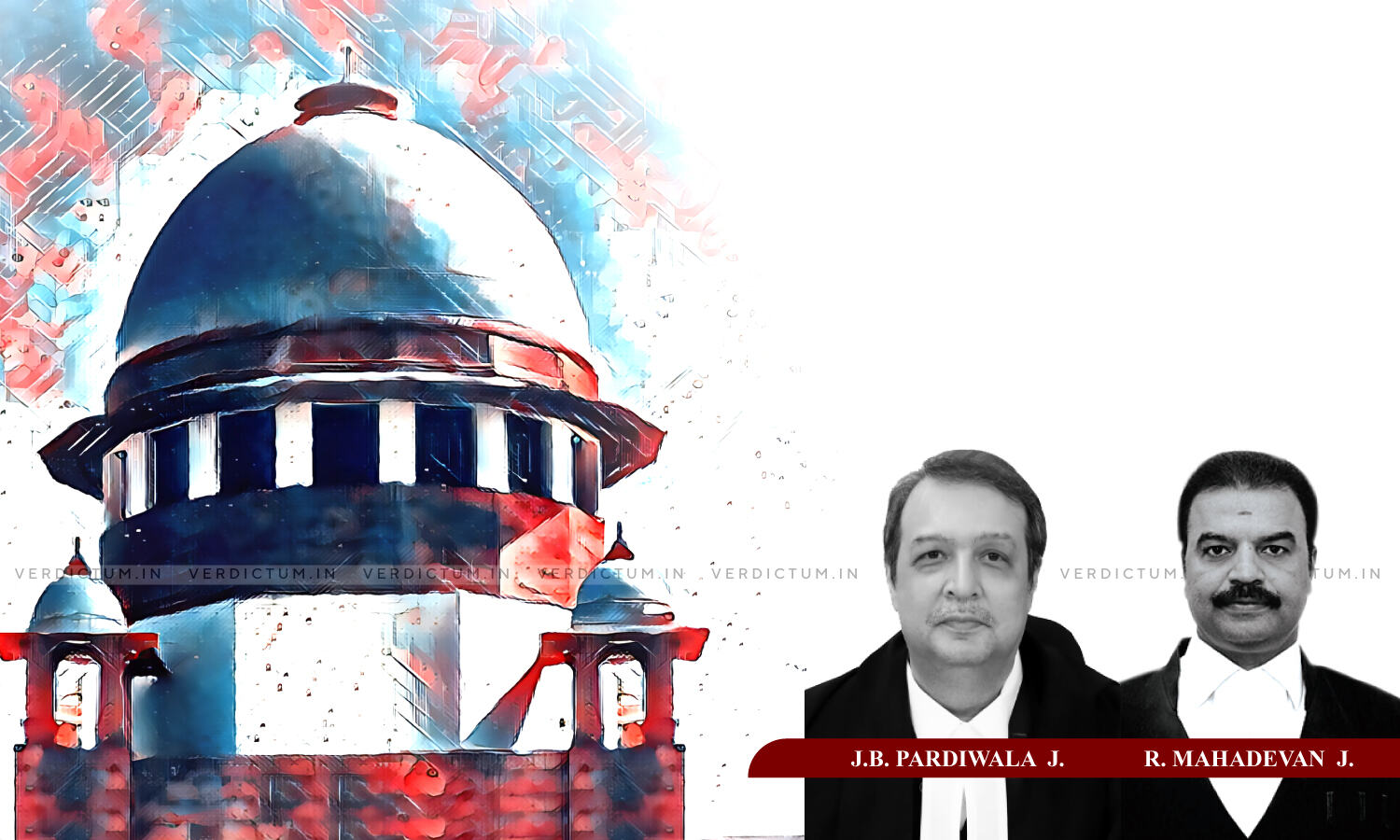If A Person Is Arrested On A Warrant, The Grounds For Reasons For The Arrest Is The Warrant Itself

The Supreme Court held that if a person is arrested on a warrant, the grounds for reasons for the arrest is the warrant itself.
The Court upheld the decision of the Andhra Pradesh High Court, which dismissed a Writ Petition seeking a Writ of Habeas Corpus, filed on the ground that the Appellant’s son, Kessireddy Raja Shekhar Reddy, was illegally arrested by the CID and was in unlawful detention.
The Bench of Justice JB Pardiwala and Justice R Mahadevan held that “If a person is arrested on a warrant, the grounds for reasons for the arrest is the warrant itself; if the warrant is read over to him, that is sufficient compliance with the requirement that he should be informed of the grounds for his arrest. If he is arrested without a warrant, he must be told why he has been arrested. If he is arrested for committing an offence, he must be told that he has committed a certain offence for which he would be placed on trial. In order to inform him that he has committed a certain offence, he must be told of the acts done by him which amounts to the offence. He must be informed of the precise acts done by him for which he would be tried; informing him merely of the law applicable to such acts would not be enough.”
Senior Advocates Mahesh Jethmalani, Navin Pahwa and Ponnavolu Sudhakar Reddy appeared for the Appellant, while Senior Advocates Sidharth Luthra and Siddharth Aggarwal represented the Respondents.
Brief Facts
The FIR was registered under Sections 420, 409, 120B, 34 of the IPC, read with Sections 13(1)(c) and 13(1)(d) of the Prevention of Corruption Act, 1988 (PC Act), as well as Section 7 of the Andhra Pradesh Protection of Depositors of Financial Establishments Act, 1999 (APPDFE Act). The Appellant’s son came to be arrested in connection with the same.
Court’s Reasoning
The Supreme Court referred to its decision in Vihaan Kumar v. State of Haryana, wherein the Court set a clear precedent that the investigating agency/ police officer/ authorities effecting arrest of any person in connection with any cognizable offence without a warrant must provide specific, actionable reasons for an individual’s arrest, beyond citing broad provisions of law.
“Thus, the requirement of informing the person arrested of the grounds of arrest is not a formality but a mandatory constitutional requirement. Article 22 is included in Part III of the Constitution under the heading of Fundamental Rights. Thus, it is the fundamental right of every person arrested and detained in custody to be informed of the grounds of arrest as soon as possible. If the grounds of arrest are not informed as soon as may be after the arrest, it would amount to a violation of the fundamental right of the arrestee guaranteed under Article 22(1),” it was held.
Thus, the following principles of law could be said to have been laid down, rather very well explained, in Vihaan Kumar (supra):
“a) The requirement of informing the person arrested of the grounds of arrest is not a formality but a mandatory constitutional condition.
b) Once a person is arrested, his right to liberty under Article 21 is curtailed. When such an important fundamental right is curtailed, it is necessary that the person concerned must understand on what grounds he has been arrested.
c) The mode of conveying the information of the grounds of arrest must be meaningful so as to serve the true object underlying Article 22(1).
d) If the grounds of arrest are not informed as soon as may be after the arrest, it would amount to a violation of the fundamental right of the arrestee guaranteed under Article 22(1).
e) On the failure to comply with the requirement of informing the grounds of arrest as soon as may be after the arrest, the arrest would stand vitiated. Once the arrest is held to be vitiated, the person arrested cannot remain in custody even for a second.
f) If the police want to prove communication of the grounds of arrest only based on a diary entry, it is necessary to incorporate those grounds of arrest in the diary entry or any other document. The grounds of arrest must exist before the same are informed.
g) When an arrestee pleads before a court that the grounds of arrest were not communicated, the burden to prove the compliance of Article 22(1) is on the police authorities.
h) The grounds of arrest should not only be provided to the arrestee but also to his family members and relatives so that necessary arrangements are made to secure the release of the person arrested at the earliest possible opportunity so as to make the mandate of Article 22(1) meaningful and effective, failing which, such arrest may be rendered illegal.”
The Bench remarked, “The object underlying the provision that the grounds of arrest should be communicated to the person arrested has been very succinctly explained in Vihaan Kumar (supra). On learning about the grounds for arrest, the person concerned will be in a position to make an application before the appropriate Court for bail, or move the High Court for a writ of habeas corpus. Further, the information will enable the arrested person to prepare his defence in time for the purposes of his trial. For these reasons, it has been provided by the Constitution that, the ground for the arrest must be communicated to the person arrested as soon as possible.”
Consequently, the Court ordered, “In view of the aforesaid, we do not find any merit in this appeal. The same is accordingly dismissed.”
Accordingly, the Supreme Court dismissed the Appeal.
Cause Title: Kasireddy Upender Reddy v. State Of Andhra Pradesh & Ors. (Neutral Citation: 2025 INSC 768)
Appearance:
Appellant: Senior Advocates Mahesh Jethmalani, Navin Pahwa and Ponnavolu Sudhakar Reddy; Advocates Ramesh Allanki, Aruna Gupta, Shriharsha Peechara, Syed Ahmad Naqvi, Shreevardhan Dhoot, M. Bala Krishna, T. Vijaybhaskar Reddy, Yash Gupta, Krishna Kumar Singh, Serena Jethmalani, Ajay Awasthi, Mugdha Pande, Vaibhav Thaledi and Yashaswi SK Chocksey; AOR Alabhya Dhamija and Krishna Kumar Singh
Respondents: Senior Advocates Sidharth Luthra and Siddharth Aggarwal; AOR Guntur Pramod Kumar; Advocates Prerna Singh, Samarth Krishan Luthra and Rajni Gupta

